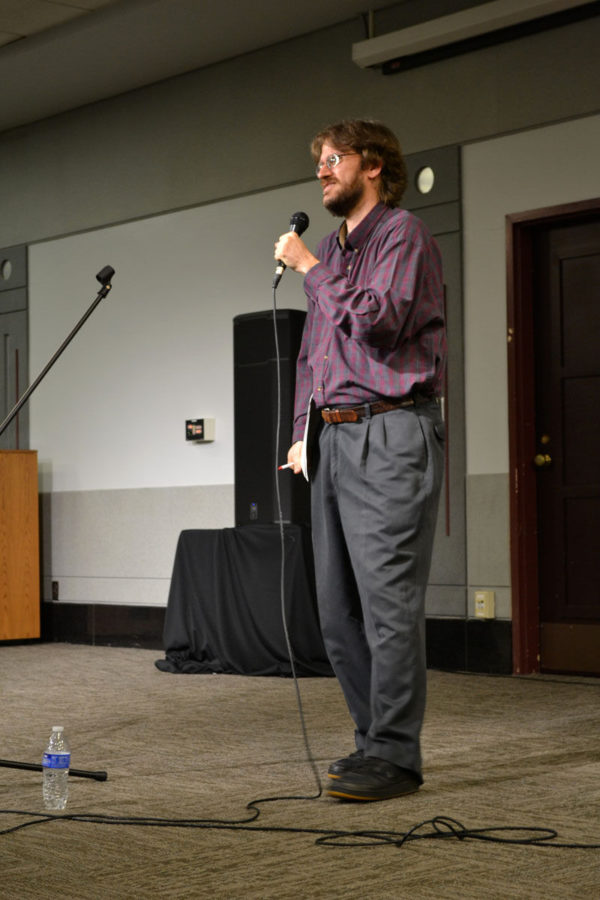AAUP addresses academic freedom, Salaita case
Zoe Grant The daily illini John K. Wilson, author and 1991 University of Illinois graduate, gives a presentation at Allen Hall Tuesday evening on academic freedom in the wake of the Steven Salaita case.
Dec 16, 2014
Last updated on May 10, 2016 at 11:03 p.m.
Steven Salaita’s rescinded appointment to the American Indian Studies program by the Board of Trustees in early September generated a chain of frequent discussions concerning academic freedom on campus.
John Wilson, co-editor of the American Association of University Professors’ Academe Blog, held an academic freedom talk in Allen Hall on Sept. 22, discussing how he believed the University violated those freedoms.
Wilson stated that opinions expressed outside of one’s profession, such as in tweets, have been significant in the “extraordinarily important” history of the University, citing the 1960 firing of Leo Koch, a former assistant professor of biology who wrote a letter to the editor of the Daily Illini that defended premarital sex, and was subsequently fired by President David Henry for the “encouragement of immoral behavior” within three weeks.
Wilson described an “enormous backlash” in 1963 from the AAUP, who decided to put the University on a censure list—the highest form of condemnation that the association has for those who violate academic freedom.
Get The Daily Illini in your inbox!
Another academic freedom event held on campus was the AAUP’s academic freedom workshop, which took place at the Illini Union on Nov. 4, addressing how advances in technology have affected universities’ actions related to academic freedom cases in recent years.
John Prussing, former president of the University AAUP Chapter, expressed that new dilemmas in modern technology have caused the need for a refreshed perspective on academic freedom for professors.
“Teachers are entitled to freedom in the classroom,” Prussing said. “Obviously, with electronic media, the definition of ‘the classroom’ has changed drastically…”
Cary Nelson, former president of the national AAUP, said the AAUP’s statutes on academic freedom provide specific protection from university discipline for remarks made as a public citizen.
“Extramural speech is defined not by where the statement was made, but by the subject addressed,” Nelson said.
Nelson emphasized the AAUP has faced difficulty over defending whether academic freedom protects privacy rights for research and teaching conducted by email and to what degree.
In light of these technological advancements, Nelson said a new definition of academic freedom has been considered.
In October, the AAUP Foundation’s Academic Freedom Fund awarded Salaita a $5,000 grant on the grounds that he was involved in an academic freedom controversy.
These grants are awarded to individuals who are either a victim of violations of academic freedoms and require legal fees, or to people involved in an academic controversy, such as Salaita, to provide personal support regardless of what the outcome of the controversy might be.
Meanwhile, Salaita quickly became an activist for academic freedom on University campuses, giving a series of talks on his controversial rejected appointment throughout October at Chicago universities including Northwestern University, DePaul University and Columbia College.
The Committee on Academic Freedom and Tenure has been considering the case, but still had not arrived at a conclusion, said Eric Johnson, past chair. Nelson expected a statement on Salaita’s case from the AAUP before the end of the year.
Faraz can be reached at [email protected].






